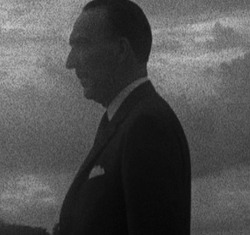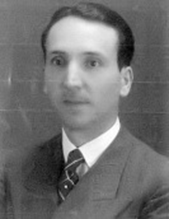
Bouras on a TV broadcast in 1955
Alexander Bouras (14 October 1907 - 3 July 2011) was a Brunanter politician and former Prime Minister from 1949 to 1957. Bouras headed three consecutive governments, the only Prime Minister to do so. During his period in office, in particular his first and into the second term, he was viewed favorably by the electorate, but suffered with allegations of corruption in his department in 1953, which ultimately led to a power-sharing agreement with the Social Democratic Party for his last term
Early life[]
Bouras was born on a farm in Cape Cross to a family of Barzuna-speaking origin. He was very distantly of mixed Catalan-Arab descent and his ancestors had arrived in the 16th century from Spain. In 1924, he was conscripted into the Royal Guard for one year service; as Prime Minister he would state he hated his time there. He later worked as a police officer in Cape Cross, making it to Inspector in the city police in 1936.
War Years[]

Bouras in 1945
Upon the outbreak of World War II in 1939, Bouras decided to join the Royal Navy. He commissioned as a 2nd Class Ensign. He was able to escape to Lovia alongside with several government members in 1941 once the Germans invaded Brunant on 20 May. Despite having no political experience, he became close to members of the Brunanter government in exile and later Prime Minister Gerhard Pietersen, advising him on military affairs. In 1944, he was promoted to the position of head of the office for soldiers at Internal Affairs.
Once Brunant was liberated, elections were scheduled for mid-1945. Pietersen asked Bouras to join the Liberals and run for Congress, and he was then appointed to assist the new Minister of Finance Ludger Reessink.
Internal Affairs minister[]
On 2 June 1946, he was named Minister of Internal Affairs by Pietersen.
With Pietersen announcing his retirement ahead of the 1949 election, Bouras was selected by him to succeed the party leadership.[1] Bouras' campaign for the Liberal Party was very much focused on continuing the stable, post-war policies and government that Pietersen had lead, going as far as announcing that "most ministers" would remain in their posts if he won, and that he would also name Pietersen to a ministry if he so chose to accept.
First Bouras government[]
On 4 May 1949, the Brunanters gave 44.8% of their votes to the Liberal Party, a slight increase over 1945 to give them 41 seats. While they held an 8-seat lead over the Whites, they became the first leading party to not command more than 50% of seats in congress.[2] Bouras was then forced to reach out to the Social Democratic Party to secure a majority and was able to agree with their leader, Anthony Heemskerk, to form a coalition government.
In 1950, he began looking to allow some measure of self-government for Berrio and at the same time he helped to reduce government expenditure for them by allowing them the option to manage their own budgets. Reaction from the parties in Congress varied greatly. Most of the White Party and CDU members were opposed to a status change, seeing the colonies not yet ready, a sentiment shared by even some in the SDP and LP. With the communists opposed to this unless it was full divestment (ie. independence), the decision was made to call early elections rather than lose a vote, hoping for an increase in Liberal seats to secure a majority or require a minimal amount of votes from other parties.
Second Bouras government[]
The election was scheduled for 15 January 1951, and the outcome would either give him or deny him a mandate for this change. The result would provide a three seat increase for the Liberals, a nine seat loss for the Whites, and a near-guaranteed passage of his plans. Laws were then passed which allowed Berrio to elect a local government that year.
Despite setting up the mechanism for Berrio to collect some of its own revenue and manage their budget, the government would still need to continue paying significant funds for those, something that became apparent well into 1951 and raised more questions. Eventually, it was decided that Internal Affairs and the Overseas would set up a fund to ensure enough funds for Berrio.
In early 1953, though, Internal Affairs began reporting a small though significant amount of money missing, earmarked for Berrio, totaling at a minimum 60.000 Th. Two high-level members of the department were implicated, and it was soon being reported by the media and some in Congress that this would not have happened without the Prime Minister's knowledge [ie. Bouras as the relevant minister]. Bouras was quick to publicly denounce the two members as corrupt and had them removed from their positions, and had most of the stolen funds paid back by his own initiative and by some recovered.
Among the public opinion was divided; some hailed his quick acting and decisive leadership on the matter, though others believed he was just as tainted and may have done what he did to try to cover up or take away from his own involvement in the scandal. Within Congress, though, it was felt that this scandal, and by extension his plan with the Overseas Territories was the result of mismanagement and that he could not be trusted. On 14 April, it was made clear by SDP president Anthony Heemskerk that his party would no longer support him in government, and Bouras was forced to call early elections. Despite repeated calls by the CDU and many for him to resign, he plead his innocence and refused to resign.
Third Bouras government[]

Bouras in 1956
Elections were set for 1 July, and the campaign was the first one where no party looked like it would a significant advantage over the others. After election day, it became clear that the Liberals suffered. Losing 14 seats, it was a massive loss for his party, with all major parties, especially the Whites and SDP gaining the most. Still, he seems to have maintained enough of a voter base to lead his party to a heavily-reduced first place.
Bouras was likely to return as Prime Minister, but he desperately needed the SDP to secure a government. The post of PM was non-discussable, but for the SDP's support, he was willing to trade External and Internal Affairs, Justice and Education, to give them just over half the departments. The SDP, who would now effectively dominate government and policy, readily agreed to the terms.
Bouras' third government was able to last a full four-year term. The SDP, effectively in charge, saw no need to destabilize the Prime Minister and risk losing their seats.

Bouras with his successor, Henry Warson
In 1956, the SDP chose Henry Warson as its president, and made it clear that the coalition would not extend past the projected 1957 election. The liberals were no longer the largest party, and Bouras no longer seemed to hold the confidence of his party. Oliver Hout succeeded him as party leader. Warson would become Prime Minister.
Later life[]
Bouras died in 2011, from natural causes. After his retirement from national politics in 1957, he became a lobbyist for several companies.